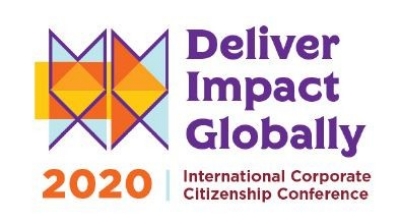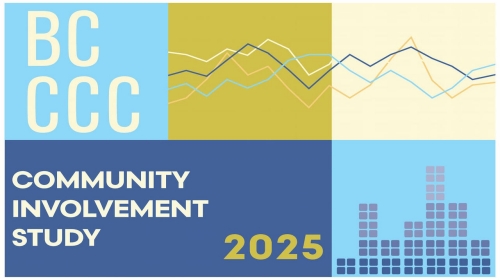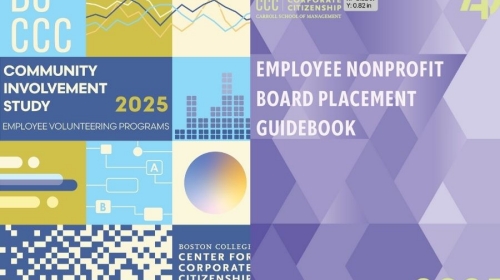RESEARCH BRIEF - Researchers investigated how ESG activities help or hurt financial performance, using nine years of data from over 1,200 global companies.
How all companies deliver impact globally

It hardly seems possible, but we at BCCCC—with our convening sponsor FedEx—are in the throes of planning for our annual conference on March 30-April 1, 2020 in San Francisco. This year’s theme, Deliver Impact Globally, serves as a call to action for corporate citizenship professionals. As we enter 2020, a new decade presents a natural opportunity to reflect on current efforts, plan for future progress, and consider what our global impact is and what we would like it to be. Remember that when we are at our most effective, our corporate citizenship work supports business objectives and delivers social impact around the world.
In the global economy, smaller companies that operate day-to-day in a more local operational footprint may be tempted to consider themselves exempt from global impacts and think of themselves as being purely local. I encourage those who fall into this category to reconsider. Even if your business operates primarily in a local context, remember you are part of the global value chain. Even local companies are accessing labor, capital, know-how, ingredients, raw materials, and a many other resources that are sources from around the world. Climate change, public health, economic inequality—these are all worldwide challenges that require multi-stakeholder solutions that cross national borders.
Many corporate citizenship portfolios include global efforts in addition to engagements with local communities already. Research from the Center’s Community Involvement Study 2019 shows that companies are now more likely to give outside of their headquarters country than they were four years ago, with nearly 50% giving globally. A majority also encourage employee volunteering both at home and abroad; 85% of global companies offer volunteer opportunities to employees outside their headquarters regions. Initiatives, such as the 3M Impact Global skills-based volunteering program deploy volunteers to projects abroad, from developing virtual STEM classes in rural China, to designing cost-efficient and environmentally friendly waste management systems in Panama.
In addition to global community involvement efforts, many companies are reaching beyond their headquarters countries on policy initiatives. As we have seen in previous months, a growing contingent of companies are signing on to agreements that commit to addressing global problems. The targets laid out by the Sustainable Development Goals (SDGs) are among the most developed of these initiatives that companies use as a guide for their sustainability goals. More than half of the companies surveyed in the Community Involvement Study 2019 report incorporating the SDGs into their corporate citizenship efforts or being in the process of doing so.
In a recent example leading up to last month’s Climate Week in New York—that also included a UN Summit on the goals—nearly 90 companies that make up the We Mean Business Coalition pledged to reduce their greenhouse gas emissions in an effort to steer multinationals towards a low-carbon future. The coalition includes AstraZeneca, which connects its corporate citizenship priorities to several SDGs. Their sustainability report notes, “As a global biopharmaceutical company investing in improving human health and advancing science, we are listening, and we recognize our responsibility to contribute to the delivery of these ambitious and valuable goals.”
FedEx is another leading company whose corporate citizenship strategy is aligned with its global mission. We learned at the 2019 International Corporate Citizenship Conference of FedEx’s companywide commitment to invest 200 million in over 200 global communities by the year 2020. Brian Phillips, president and chief executive officer of FedEx Office, summarized how this goal embodies FedEx’s vision to connect people across the world to create opportunities and improve lives. “We built our reputation on our company’s ability to connect people and possibilities around the world,” said Phillips. “…It’s the focus of our work—and it’s actually the focus of our corporate social responsibility efforts as well.” We look forward to FedEx’s update on its ambitious goal at the 2020 International Corporate Citizenship Conference, where company will be the convening sponsor.
I invite you to join us on March 30-April 1 at the 2020 International Corporate Citizenship Conference in San Francisco. There, you will encounter plentiful opportunities to learn best practices, network in a unique corporate-only context, and gain tools to apply immediately to your corporate social responsibility work. Seize this opportunity to improve your corporate citizenship knowledge and make a positive impact in the world in 2020 and beyond! Register now for the best rate.
Related Content
RESEARCH BRIEF - Researchers analyzed 4 US energy exchange-traded funds (ETFs) over 15 years, including 2 dirty energy funds tracking fossil fuel companies and 2 clean energy funds tracking renewable energy companies.
RESEARCH BRIEF - Researchers conducted a survey, which measured perceptions of CSR and ethical leadership within the manufacturing and service industries.
WEBINAR: This webinar explores how corporate giving will be reshaped by the One Big Beautiful Bill. Hear directly from corporate citizenship leaders as they share innovative, real-world strategies that deliver impact for communities and results for business.
This study explores shifting trends in employee volunteering, corporate giving, and other means of corporate community involvement.
This guidebook offers insights on placing employees in nonprofit board service roles.
This Member Meetup focused on strategies for building compelling business cases for corporate social responsibility initiatives. Two organizations shared their approaches to securing leadership buy-in and funding for CSR programs by anchoring requests in business strategy, quantifying value, and crafting persuasive narratives.
RESEARCH BRIEF - To examine whether CSR Activities affect Long-term Stock Returns, researchers studied 6971 observations of common stock of Japanese firms operating globally, along with accounting data and ownership data.








